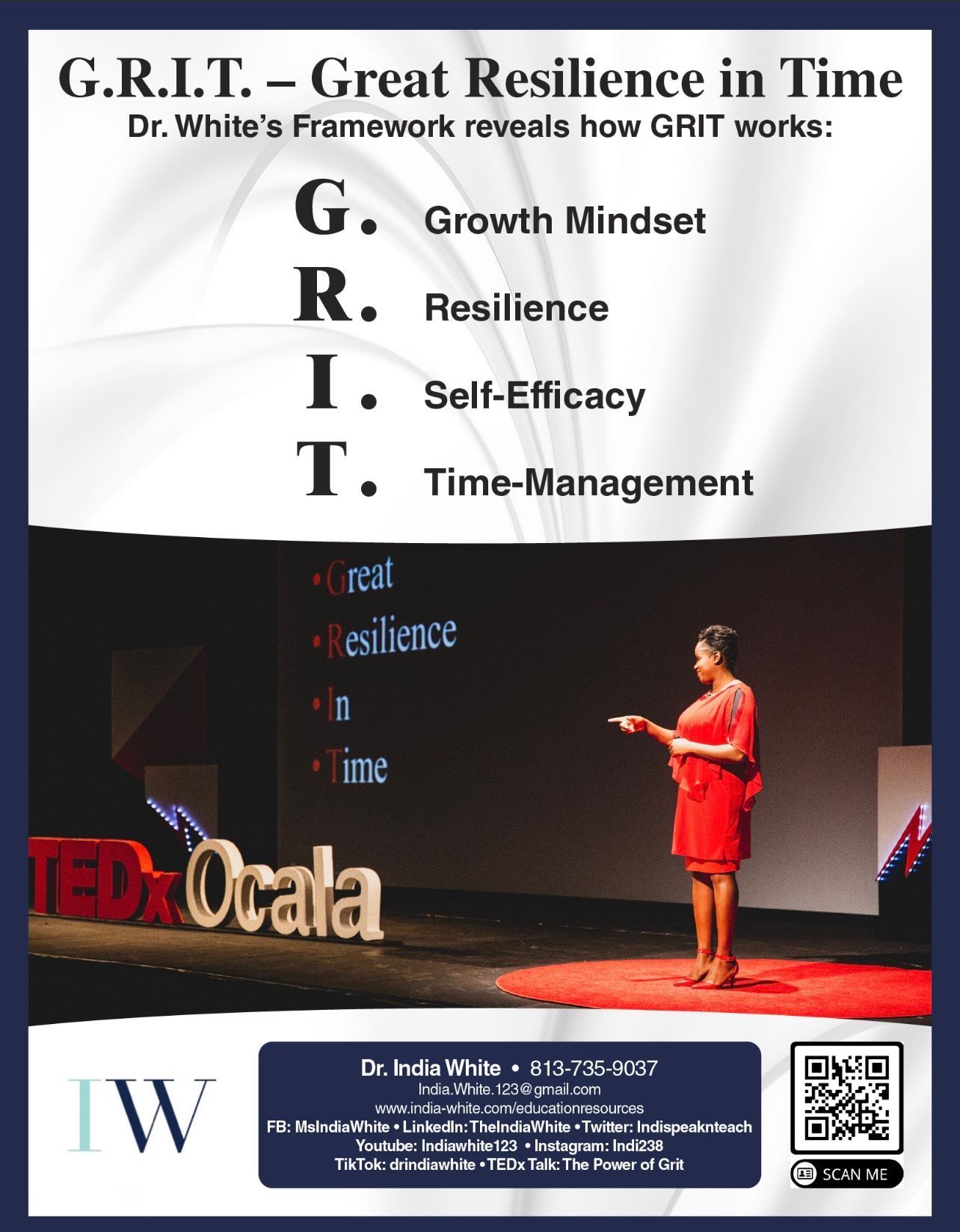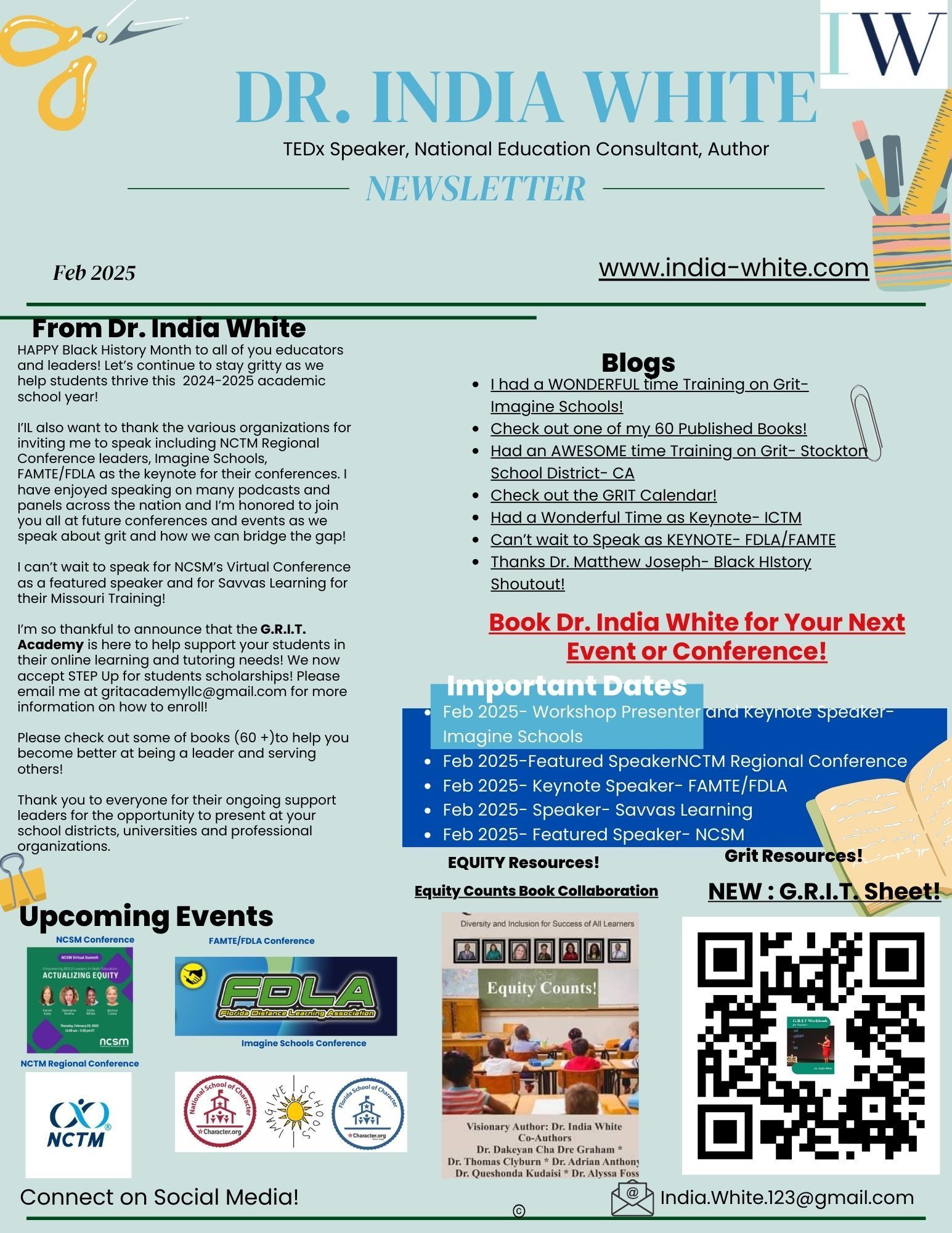Dr. India White’s G.R.I.T. Framework—which emphasizes the pillars of Growth Mindset, Self-Efficacy, Resilience, and Time Management—directly aligns with the Characteristics of an Effective Health Education Curriculum by shaping behaviors, skills, and values that foster long-term health and well-being. Here's how the G.R.I.T. framework supports each characteristic of an effective health curriculum:
1. Teaching Functional Health Information (Essential Knowledge)
An effective health curriculum provides students with essential knowledge about their mental, physical, and emotional health. The G.R.I.T. Framework enriches this by incorporating a growth mindset—teaching students that their ability to understand and apply health information can improve with effort and perseverance. For example, students learn that adopting healthy habits is not a fixed ability but a skill that can be developed over time. This approach goes beyond factual knowledge to empower students to take ownership of their health journey.
2. Shaping Personal Values and Beliefs that Support Healthy Behaviors
Dr. White’s framework also nurtures self-efficacy, helping students believe in their own capacity to succeed in health-related tasks, such as managing stress, making healthy choices, or building relationships. When students develop self-efficacy, they are more likely to adopt and maintain behaviors like regular exercise, balanced nutrition, and mental health care. By reinforcing that they are capable of change and improvement, the G.R.I.T. approach shapes personal values that emphasize persistence and healthy habits.
3. Shaping Group Norms that Value a Healthy Lifestyle
The resilience pillar of G.R.I.T. teaches students how to bounce back from adversity—whether in academics, personal life, or health challenges. This concept of resilience helps create group norms that value mental and emotional health, especially in school environments where stress and peer pressure can be significant challenges. By embedding the idea that resilience is a shared value, the G.R.I.T. framework encourages students to support each other, reducing stigma around mental health and encouraging a culture where seeking help and maintaining well-being are normalized.
4. Developing the Essential Health Skills Necessary to Adopt, Practice, and Maintain Health-Enhancing Behaviors
Health education must focus on building practical skills that help students navigate real-world health challenges. G.R.I.T. emphasizes time management, which is key to maintaining healthy routines. When students learn how to manage their time effectively, they are better able to balance academic demands, physical activity, proper sleep, and personal relaxation—all critical components of a healthy lifestyle. The time management pillar helps students develop habits like planning meals, scheduling exercise, or setting aside time for mental wellness activities, thereby reinforcing the ability to adopt and maintain health-enhancing behaviors.
How G.R.I.T. Reinforces Great Resilience in Time
At the core of Dr. White’s G.R.I.T. framework is the concept of Great Resilience In Time. This means teaching students that resilience isn’t just about bouncing back—it’s about long-term persistence and the ability to manage challenges over time. Whether it’s coping with stress, overcoming unhealthy habits, or dealing with setbacks in physical and mental health, G.R.I.T. gives students the tools they need to handle life’s difficulties with consistency and patience.
By teaching students to embrace a growth mindset, they learn to view health and wellness as a continuous journey of improvement, not something defined by immediate success or failure. Self-efficacy provides the confidence needed to make positive health choices. Resilience instills the ability to navigate challenges and setbacks, while time management ensures that students can sustain these behaviors over the long term. Together, these pillars equip students with the skills and mindset to thrive in the long run.
Conclusion
The G.R.I.T. framework deeply aligns with the characteristics of an effective health education curriculum. By focusing on long-term resilience and health-enhancing behaviors, it not only teaches essential health knowledge but also helps shape personal beliefs, values, and habits that lead to a healthy, fulfilling life. Through growth mindset, self-efficacy, resilience, and time management, students learn to take charge of their health, support each other, and cultivate the life skills necessary for mental, physical, and emotional well-being.
References
Centers for Disease Control and Prevention. (2024) Characteristics of an
effective health education curriculum. U.S. Department of Health and
Human Services. Retrieved from
https://www.cdc.gov/healthyschools/sher/characteristics/index.htm











